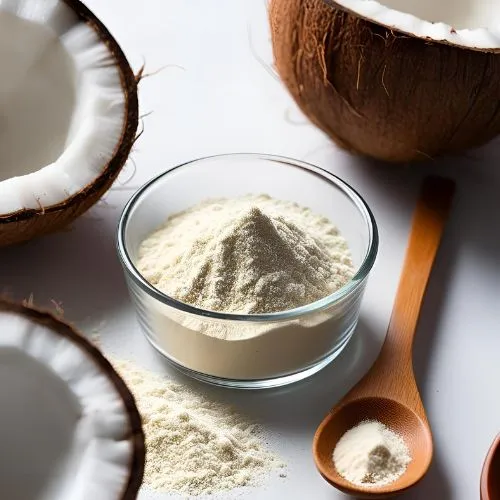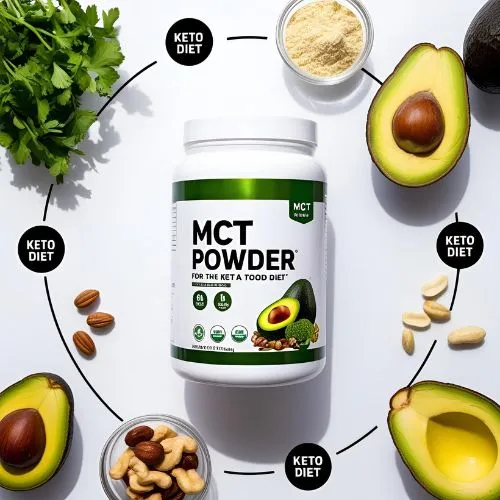Does MCT Make You Lose Weight?
MCT powder has gained significant attention in the health and wellness community for its potential weight loss benefits. As more people search for effective ways to shed excess pounds, MCT (Medium-Chain Triglyceride) powder has emerged as a promising supplement. In this comprehensive guide, we'll explore the science behind MCT powder and its impact on weight loss, metabolism, and overall health.

How MCT Powder Boosts Your Metabolism for Weight Loss?
MCT powder is derived from coconut oil and contains concentrated medium-chain fatty acids. These unique fats are metabolized differently than long-chain fatty acids found in most foods. When consumed, MCTs are rapidly absorbed and transported directly to the liver, where they're quickly converted into energy.
Thermogenic Effect of MCTs
One of the key ways MCT powder supports weight loss is through its thermogenic effect. Thermogenesis refers to the production of heat in the body, which can increase calorie burning. Studies have shown that MCTs can boost thermogenesis, leading to a higher metabolic rate and increased energy expenditure.
Appetite Suppression
Another mechanism by which MCT powder may contribute to weight loss is through appetite suppression. Research suggests that MCTs can increase the production of hormones that promote feelings of fullness and satiety. By reducing overall calorie intake, MCT powder may help create a calorie deficit necessary for weight loss.
Enhanced Fat Oxidation
MCT powder has been found to enhance fat oxidation, the process of breaking down stored fat for energy. By promoting the use of fat as fuel, MCTs may assist in lowering body fat percentage and support weight loss goals. This can help improve overall fat metabolism, making it a valuable addition to a weight management plan or fitness regimen.

Is MCT Powder Effective for Keto and Fat Burning?
The ketogenic diet has surged in popularity as a weight loss strategy, and MCT powder plays a significant role in this low-carb, high-fat approach to nutrition.
MCTs and Ketosis
MCT powder is particularly beneficial for those following a ketogenic diet. When carbohydrate intake is restricted, the body enters a state of ketosis, where it primarily burns fat for fuel. MCTs are rapidly converted into ketones in the liver, which can help individuals achieve and maintain ketosis more easily.
Increased Fat Burning
By stimulating ketone production, MCT powder can boost the body’s ability to burn fat for energy. This process is particularly beneficial for those aiming to lower body fat percentage and improve body composition. By supporting fat metabolism, MCTs can aid in achieving fitness goals, making them a helpful addition for individuals focused on reducing fat and enhancing overall body shape.
Sustained Energy Levels
One challenge of low-carb diets is maintaining consistent energy levels. MCT powder offers a rapid and efficient energy source, helping to combat fatigue and sustain physical performance during ketosis. By providing an alternative fuel source for the body, MCTs ensure that energy levels remain steady, even when carbohydrate intake is low. This makes MCT powder a valuable supplement for those seeking to maintain vitality and optimal performance on a low-carb or ketogenic diet.
Top Benefits of MCT Powder Beyond Weight Loss
While weight loss is a primary reason many people turn to MCT powder, its benefits extend far beyond shedding pounds.
Cognitive Function
MCTs have been linked to improved cognitive function and brain health. The ketones produced from MCT metabolism can cross the blood-brain barrier, providing an alternative energy source for brain cells. This may lead to enhanced mental clarity, focus, and potentially even neuroprotective effects.
Gut Health
Emerging research suggests that MCT powder may have a positive impact on gut health. MCTs possess antimicrobial properties that can help balance the gut microbiome and support digestive health. This could lead to improved nutrient absorption and overall well-being.
Athletic Performance
Athletes and fitness enthusiasts may benefit from incorporating MCT powder into their regimen. The quick-acting energy provided by MCTs can support endurance and potentially improve exercise performance. Additionally, MCTs may help reduce lactate buildup during high-intensity workouts, potentially delaying fatigue.
Heart Health
Contrary to previous beliefs about saturated fats, some studies suggest that MCTs may have a positive impact on cardiovascular health. MCT consumption has been associated with improved lipid profiles, including reduced LDL cholesterol and increased HDL cholesterol levels.

Conclusion
In conclusion, MCT powder offers a range of potential benefits for those seeking to lose weight and improve overall health. From boosting metabolism and supporting ketosis to enhancing cognitive function and athletic performance, MCTs have emerged as a versatile supplement in the health and wellness landscape. However, it's important to note that MCT powder should be used as part of a balanced diet and healthy lifestyle for optimal results.
If you're interested in learning more about MCT powder and its potential benefits, or if you're looking for high-quality MCT supplements, don't hesitate to contact us at info@yanggebiotech.com. Our team of experts is here to answer your questions and provide guidance on incorporating MCT powder into your wellness routine.
FAQ
Q: Can we get some samples to test before purchasing?
A: Of course, we can provide free samples of 20 to 100 grams, but the shipping cost is at the customer's expense. The shipping cost can be deducted from the next order, or the samples can be sent through your courier account.
Q: Do your products have relevant certifications?
A: Yes, our products are certified for HALAL, ISO, HACCP, Kosher, and other certifications.
Q: What is the minimum order quantity (MOQ)?
A: Small batches of samples can be customized according to your requirements.
Q: Do you offer OEM and ODM services? Can the formula be customized based on our own?
A: Of course, we provide ODM and OEM services to many customers. Our product range includes softgels, capsules, tablets, sachets, granules, and private label services. Simply contact us and let us know your requirements. Our experienced R&D team can also develop new products with specific formulas.
Please contact us to design your own branded products.
Q: How do you handle quality complaints?
A: First, we have a comprehensive quality control SOP. We provide authoritative third-party inspection reports for almost all products before shipment to minimize the possibility of quality issues. Second, we have a comprehensive return and exchange procedure. If there is a genuine quality dispute, we will strictly follow the SOP.
Q: How do you ship? How long does delivery take?
A: For small orders, we typically use DHL, UPS, EMS, FedEx, or TNT. Delivery typically takes 3-7 days. We also offer air and sea freight services. We have a strong freight forwarding team and can provide you with a one-stop service, including DDP and DDU.
Q: What are your payment terms?
A: 100% prepayment, payable by T/T, Western Union, MoneyGram, or PayPal.
Q: What is the shelf life of your products?
A: 2 years with proper storage.
Q: Is the packaging environmentally friendly?
A: We attach great importance to environmental protection and are constantly improving our product packaging. Some products are packaged in recyclable paper. Packaging materials are carefully selected to ensure product safety during transportation and storage, and to minimize environmental impact. We are committed to achieving a balance between environmental friendliness and practicality in our product packaging, and to contributing to sustainable development.
References
1. St-Onge, M. P., & Bosarge, A. (2008). Weight-loss diet that includes consumption of medium-chain triacylglycerol oil leads to a greater rate of weight and fat mass loss than does olive oil. The American Journal of Clinical Nutrition, 87(3), 621-626.
2. Clegg, M. E. (2010). Medium-chain triglycerides are advantageous in promoting weight loss although not beneficial to exercise performance. International Journal of Food Sciences and Nutrition, 61(7), 653-679.
3. Mumme, K., & Stonehouse, W. (2015). Effects of medium-chain triglycerides on weight loss and body composition: a meta-analysis of randomized controlled trials. Journal of the Academy of Nutrition and Dietetics, 115(2), 249-263.
4. Page, K. A., Williamson, A., Yu, N., McNay, E. C., Dzuira, J., McCrimmon, R. J., & Sherwin, R. S. (2009). Medium-chain fatty acids improve cognitive function in intensively treated type 1 diabetic patients and support in vitro synaptic transmission during acute hypoglycemia. Diabetes, 58(5), 1237-1244.
5. Rial, S. A., Karelis, A. D., Bergeron, K. F., & Mounier, C. (2016). Gut microbiota and metabolic health: the potential beneficial effects of a medium chain triglyceride diet in obese individuals. Nutrients, 8(5), 281.
Based on your location and order quantity, you will have the opportunity to receive a limited time free shipping promotion!

Who we are


